#1. Definition of ‘Ayu’ – Life
Source: Charak Samhita
शरीरेन्द्रिय्सत्त्वात्म्संयोगो धारि जीवितम् ।
नित्यगश्र्चानुबन्धश्र्च पर्यायौरायुरुच्यते ॥
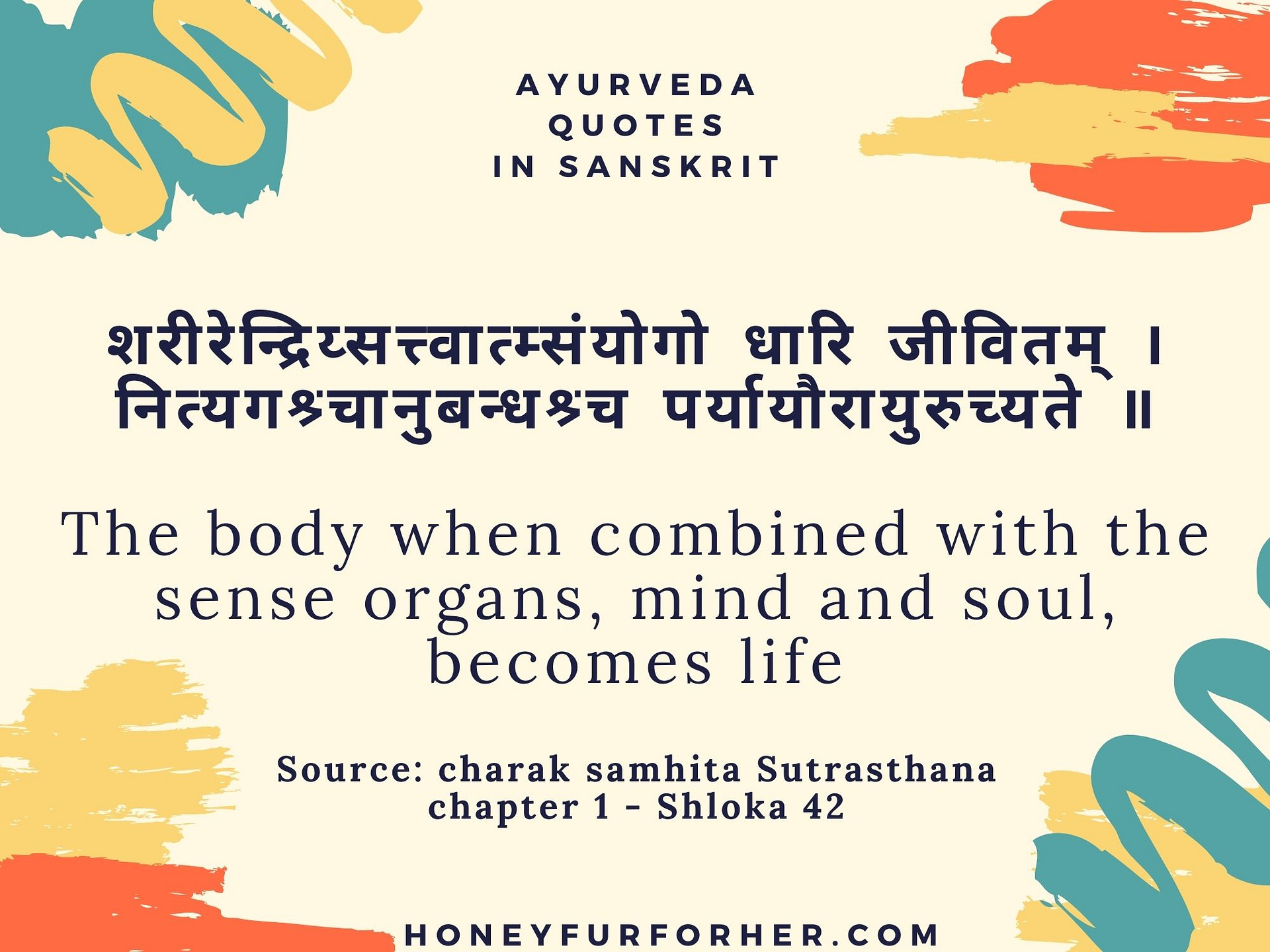
English Translation:
The term ‘Ayu’ meaning life is a combination of the Shareera (The Body), Indriya (Sense Organs), Satva (The Mind) & Atma (The Soul).
The body when combined with other three i.e sense organs, mind and soul, becomes life. Without the combination of all four, life does not exist.
Synonyms of life are
- Dhari – the one that prevents the body from decay,
- Jeevita – the one which remains alive, maintains life,
- Nityaga – which keeps the soul, mind and sense intact with the body all the time, without discontinuation.
- Anubandha – That which transmigrates from one body to another.
#2. Tridanda – Mind, Body & Soul
Source: Charak Samhita
सत्त्वमात्मा शरीरं च त्रयमेतन्त्त्रिदण्डत् |
लोकस्तिष्ठति संयोगात्तत्र सर्वं प्रतिष्ठितम् ||
स पुमांश्र्चेतनं तच्च तच्चाधिकरणं स्मृतम् |
वेदस्यास्य, तदर्थं हि वेदोअयं सम्प्रकाशितः ||
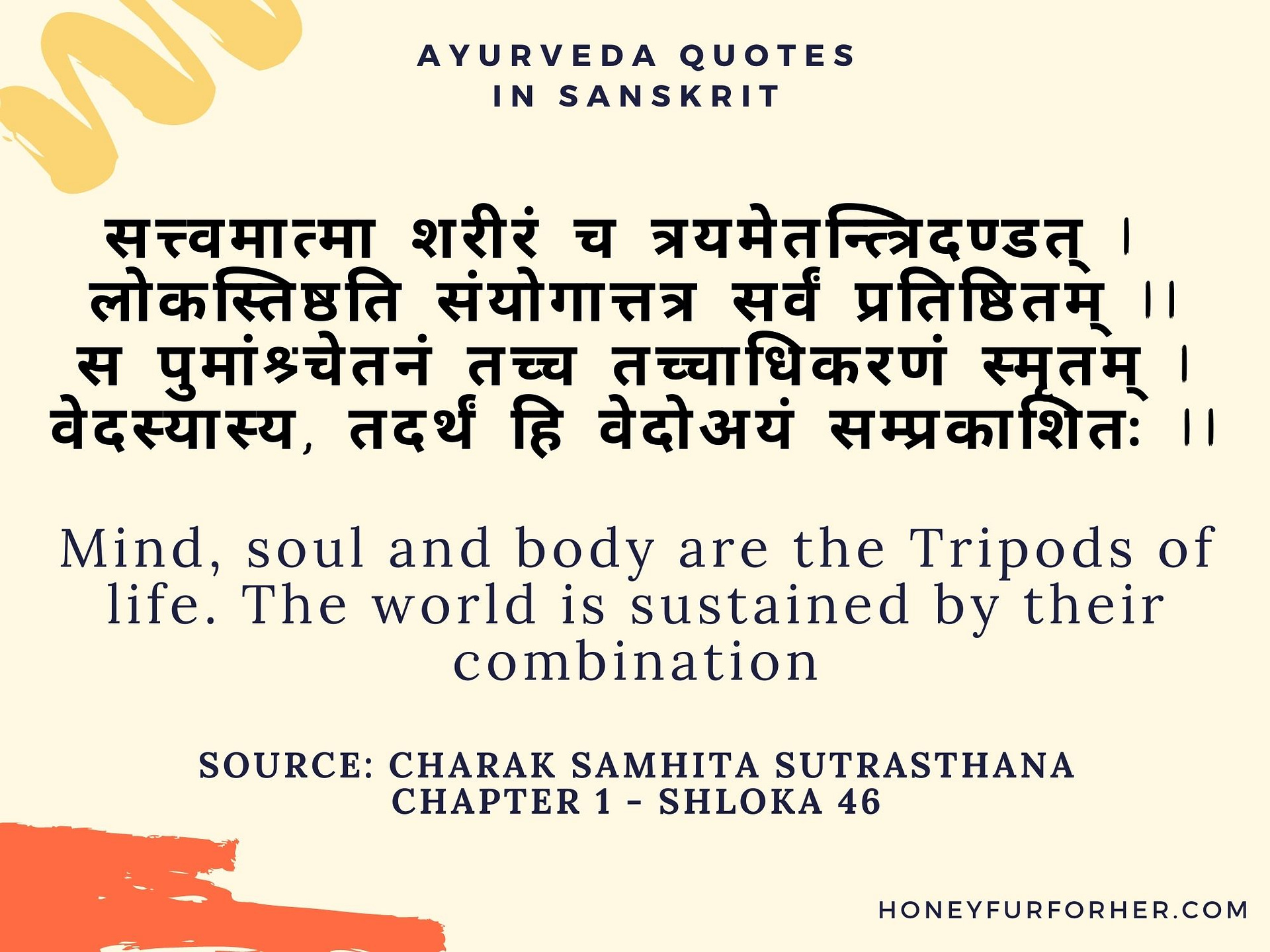
English Translation:
Tridanda:
Satva (The Mind), Shareera (The Body) and Atma (The Soul) are the Tripods of life. The world is sustained by their combination; They constitute the basis for everything.
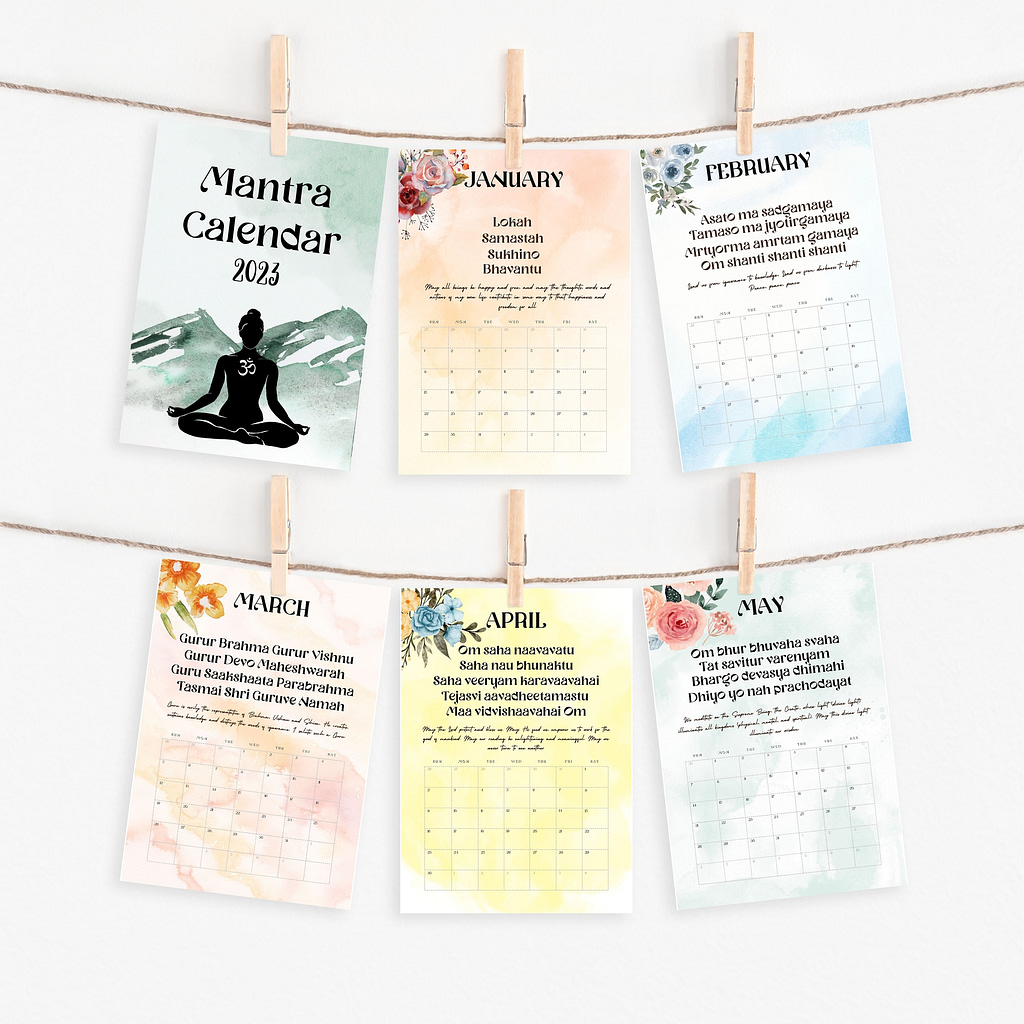
#3. Definition of Atman (The Soul)
Source: Charak Samhita
निर्विकार: परस्त्वात्मा सत्वभूतगुणेन्द्रियै: ।
चैतन्ये कारणं नित्यो द्रष्टा पश्यति हि क्रिया: ॥
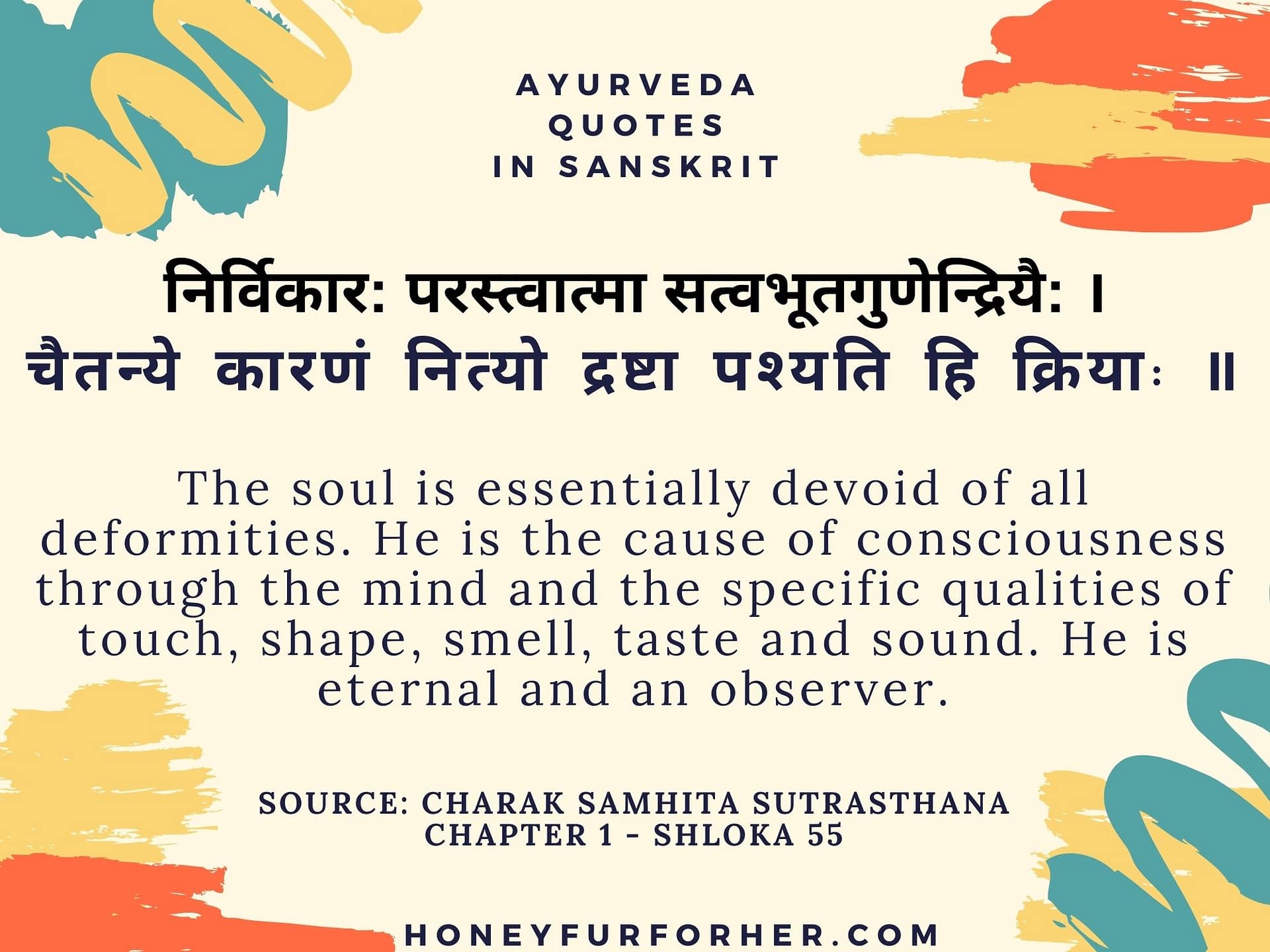
English Translation:
Nirvikara – ‘nir’ means un, and virkara means changing. The word nirvikara translates to unchanging, unaltered. Here this word is used in context to the soul. as it is described as eternal and unchanging.
The soul is essentially devoid of all deformities and is the cause of consciousness through the mind and the specific qualities of basic elements (touch, shape, smell, taste and sound). He is eternal. It is he who observers all activities of body and mind from within.
#4. Ayurveda Quotes In Sanskrit: Purpose of Life
Source: Ashtanga Hridayam
आयु: कामायमानेन धर्मार्थ सुखसाधनम।
आयुर्वेदोपदेशेषु विधेय: परमादर: ॥
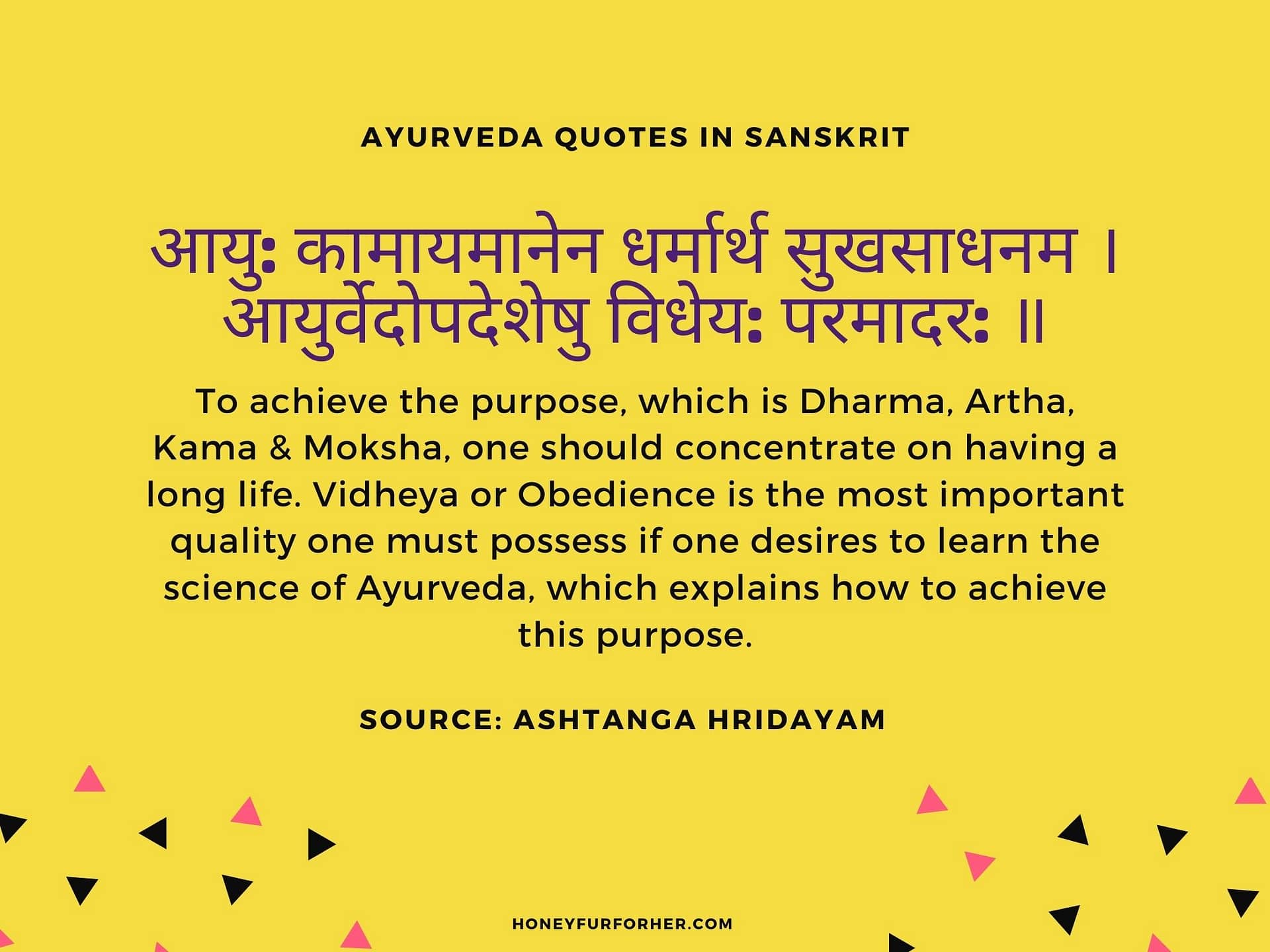
English Translation:
To achieve the purpose of life, that is
1. Dharma – Following the path of righteousness
2. Artha – Earning money using legal means.
3. Kama – Fulfilling our desire
4. Moksha – Achieving Salvation,
To achieve this purpose, one should concentrate on having a long life. Vidheya or Obedience is the most important quality one must possess if one desires to learn the science of Ayurveda, which explains how to achieve this purpose.
#5. Secret Of Good Health (आरोग्य हेतव)
Source: Ashtanga Hridayam
नित्यं हिताहारविहारसेवी समीक्ष्यकारी विषयेष्वसक्त: ।
दाता सम: सत्यपर: क्षमावानाप्तोपसेवी च भवत्यरोग: ॥
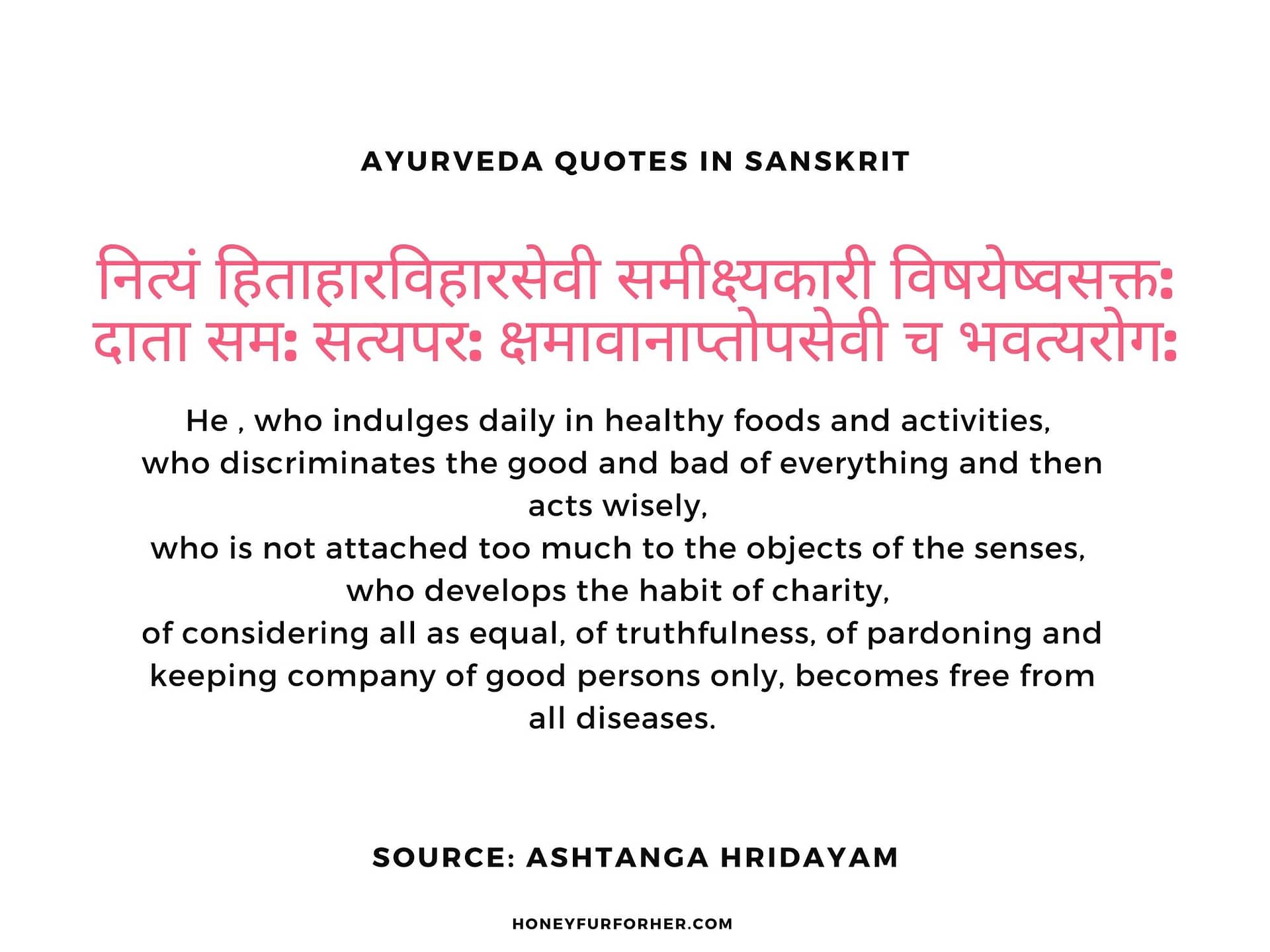
English Translation:
One who indulges daily in healthy foods and activities, who discriminates the good and bad of everything and then acts wisely, who is not attached too much to the objects of the senses, who develops the habit of charity, of considering all as equal, of truthfulness, of pardoning and keeping company of good persons only, becomes free from all diseases.
#6. Tridosha
Source: Ashtanga Hridayam
वायु पिततं कफशचेति त्रयो दोषा: समास्त: ॥
विकृता विकृतादेहं घ्नन्ति ते वर्त्तयन्ति चा ।
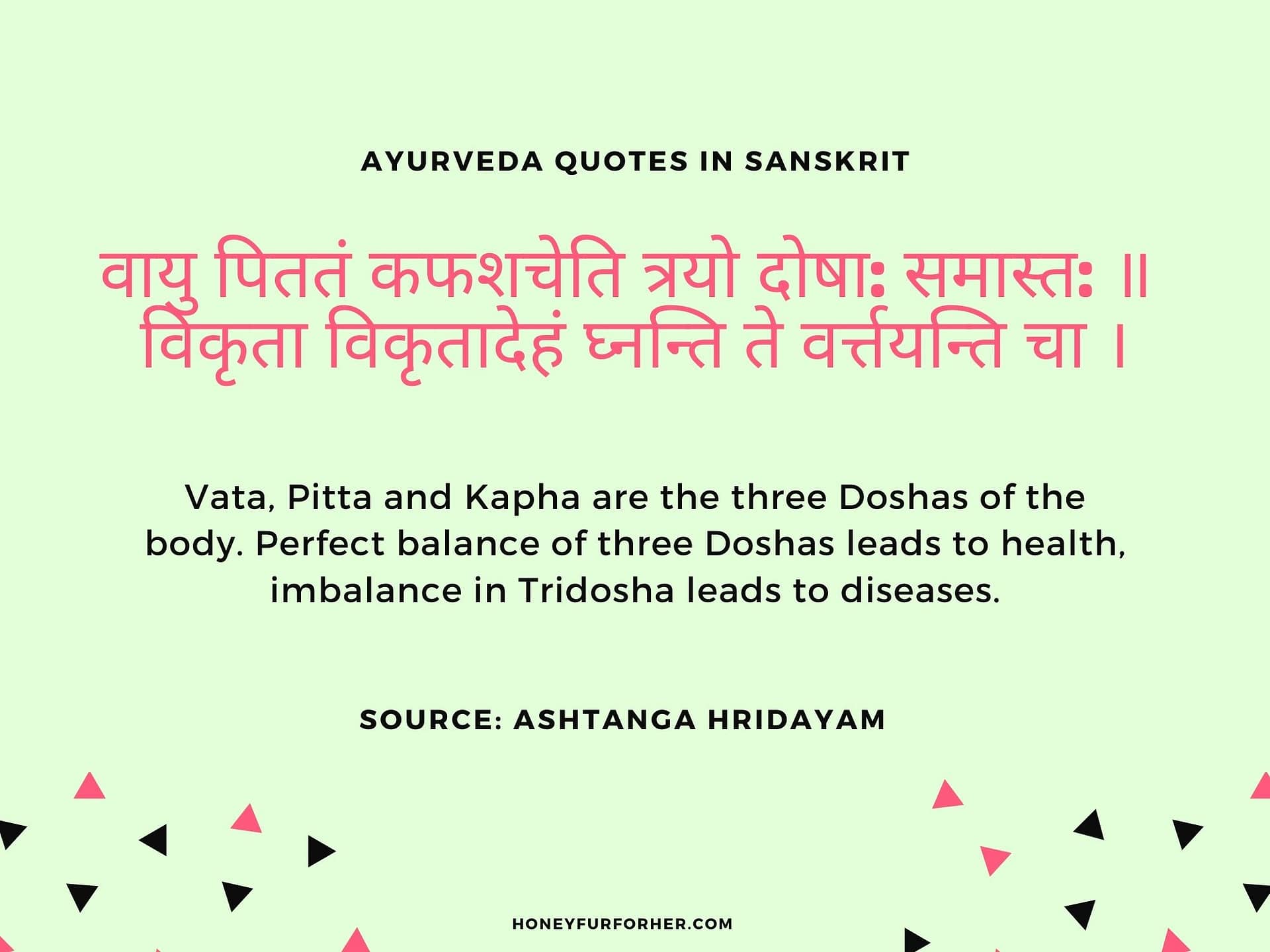
English Translation:
Vata, Pitta and kapha are the three Doshas of the body. Perfect balance of three Doshas leads to health, imbalance in Tridosha leads to diseases.
#7. Ayurveda Quotes In Sanskrit: Types Of Digestive fires
Source: Ashtanga Hridayam
तैर्भवेद्विषम: तीक्ष्णिो मन्दश्चाग्नि समै: सम: ॥
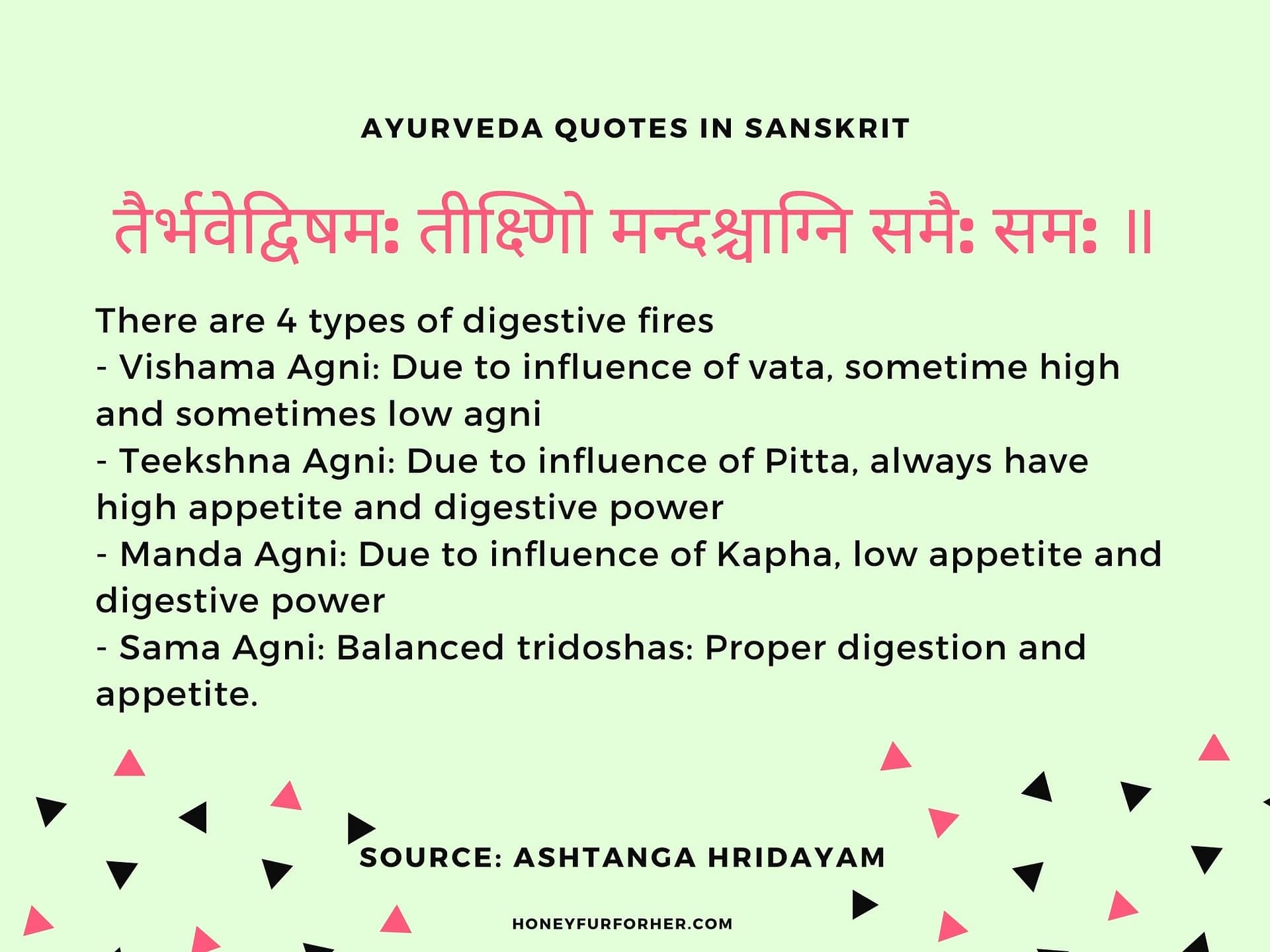
English Translation:
There are four types of Digestive fires (Agni)
1. Vishama Agni – Influenced by Vata. A person with Vishama Agni will sometimes have high appetite, and sometimes, low appetite.
2. Teekshna Agni – Influenced by Pitta. A person with Teeksna Agni will have high digestion power and appetite.
3. Manda Agni – Influenced by Kapha. A person with Manda Agni will have low digestion power and appetite.
4. Sama Agni – Influenced by perfect balance of Tridosha – Where person will have proper appetite and digestion power. Digestion occurs at appropriate time.
#8. Qualities Of Vata Dosha
Source: Ashtanga Hridayam
तत्र रुक्षो लघु: शीत: खर: सूक्ष्मश्चलोनिल: ॥

English Translation:
Rooksha – dryness, Laghu – Lightness, Sheeta – coldness, Khara – roughness, Sookshma – minuteness, Chala – movement These are the qualities of Vata.
#9. Qualities Of Pitta Dosha
Source: Ashtanga Hridayam
पित्तम् सस्नेह तिक्ष्नोष्णं लघु विस्रं सरं द्रवम् ।

English Translation:
Sasneha – slightly oily, unctuous,
Teekshna – piercing, entering into deep tissues,
Ushna -hotness,
Laghu – lightness,
Visram – bad smell,
Sara – having fluidity, movement,
Drava – liquidity are the qualities of Pitta.
#10. Qualities of Kapha Dosha
Source: Ashtanga Hridayam
स्निग्ध: शीतो गुरुर्मन्द: श्लक्ष्णो मृत्स्न: स्थिर: कफ: ।

English Translation:
Snigdhna – oily, unctuous,
Sheeta – cold,
Guru – heavy,
Manda – mild, viscous,
Shlakshna – smooth, clear,
Mrutsna – slimy, jely,
Sthira – stability, immobility are the qualities of Kapha.
#11. Cause For Health And Disease
Source: Ashtanga Hridayam
कलार्थकर्मणां योगो हिनमिथ्यातिमात्रक: ।
सम्यग्योगश्च विज्ञेयो रोगरोग्यैक कारणम् ॥
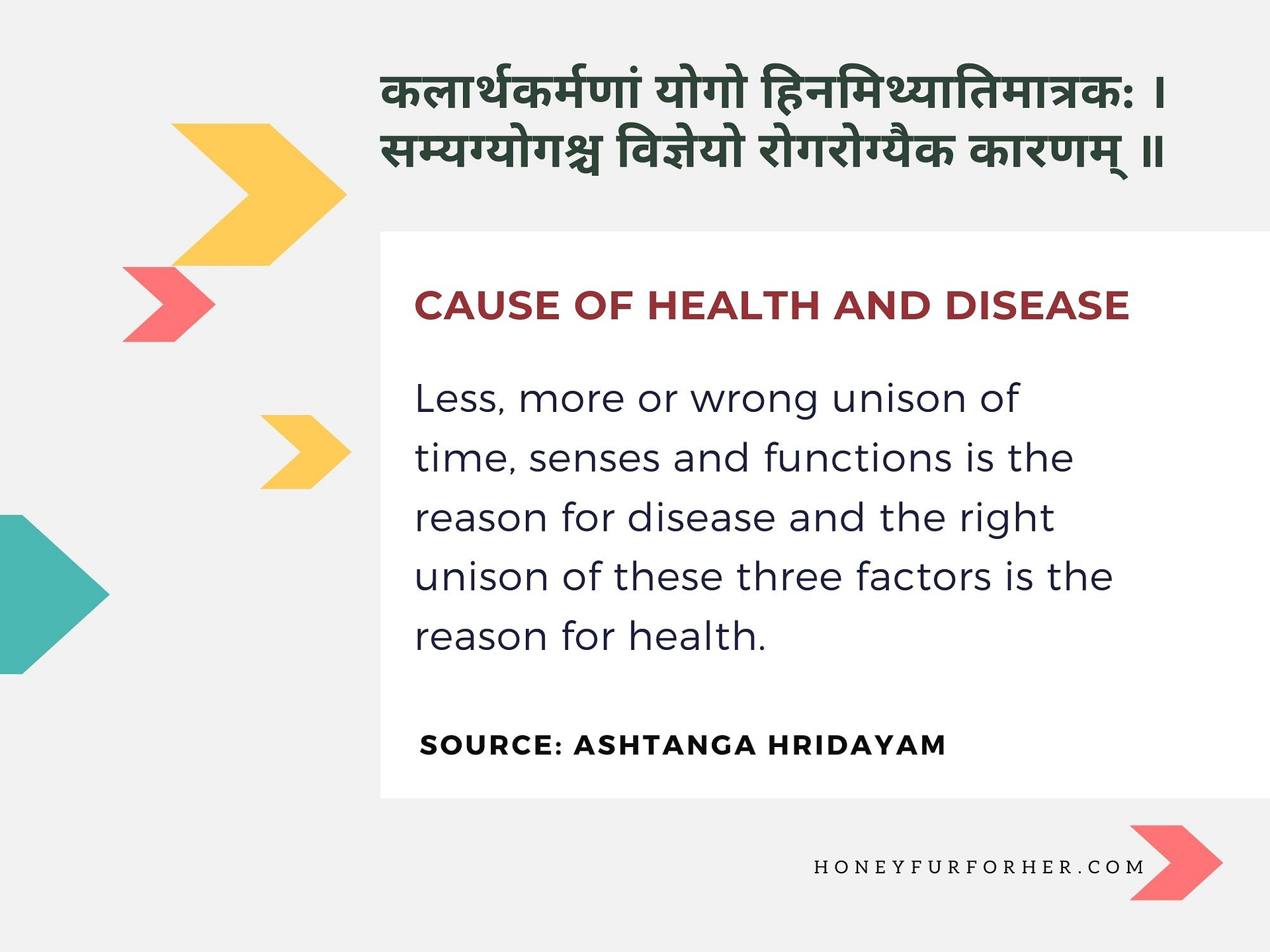
English Translation:
There are three causative factors responsible for the production of all most all diseases pertaining to the body and mind.
• Insufficient utilisiation (hinayoga),
• Wrong utilisation (mithyayoga) and
• Excessive utilisation (atiyoga)
of time (kala), objects of the sense organs (indriyarthas) and the activities of the body, mind and speech (karma).
Where as the proper utilisation (samyak yoga) of the above factors results in healthy state.
#12. Qualities Of A Doctor
Source: Ashtanga Hridayam
दक्ष: तीर्थात्तशास्त्रार्थोदृष्टकर्मशुचिर्भिषक
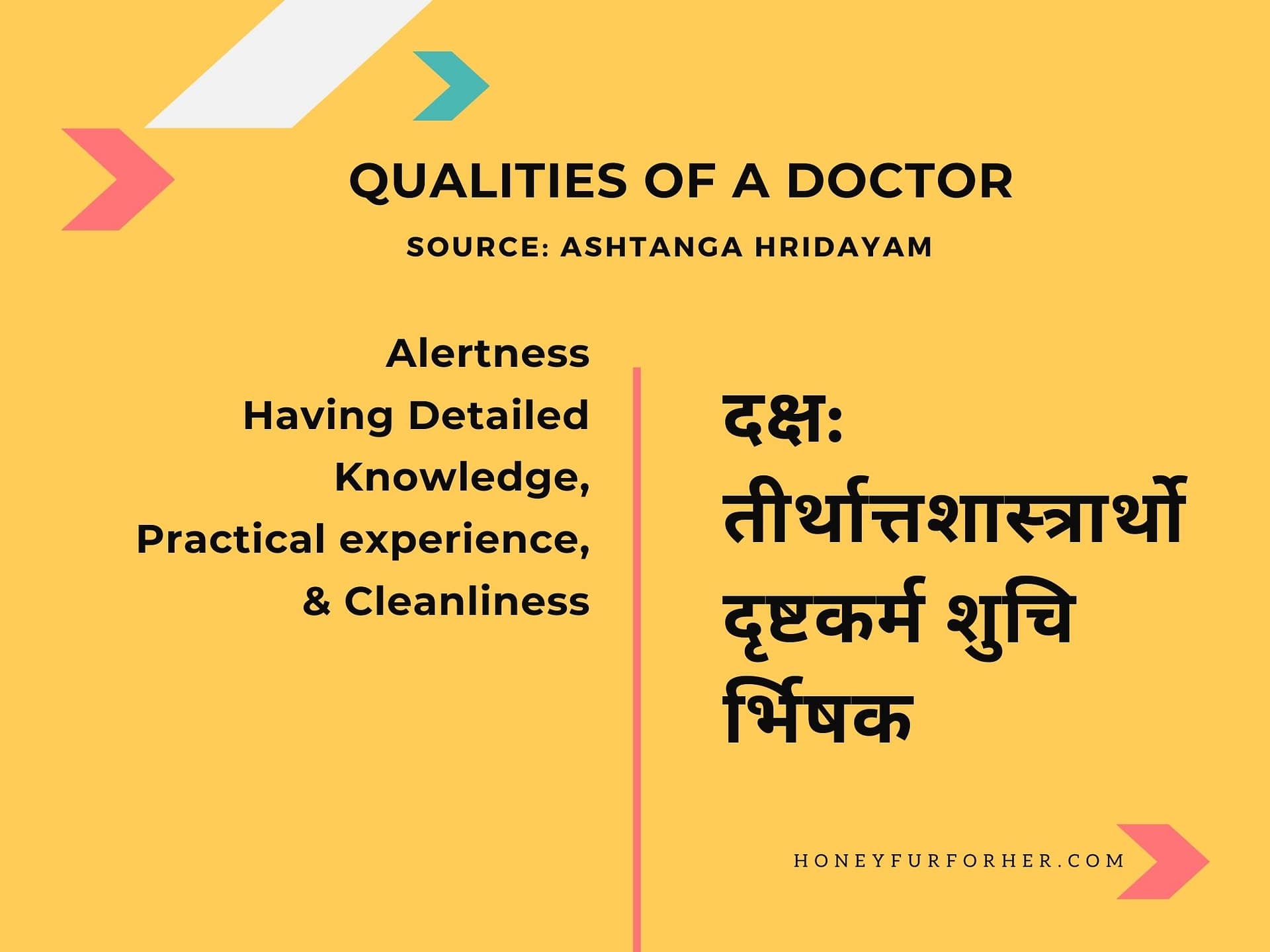
English Translation:
Daksha – Alert, disciplined
Shastra – Having detailed knowledge about diseases and treatment.
Drushtakarma – Having practical experience
Shuchi – Cleanliness
#13. Qualities Of Medicine
Source: Ashtanga Hridayam
बहुकल्पं बहुगुणं संपन्नं योग्यमौषधं ।
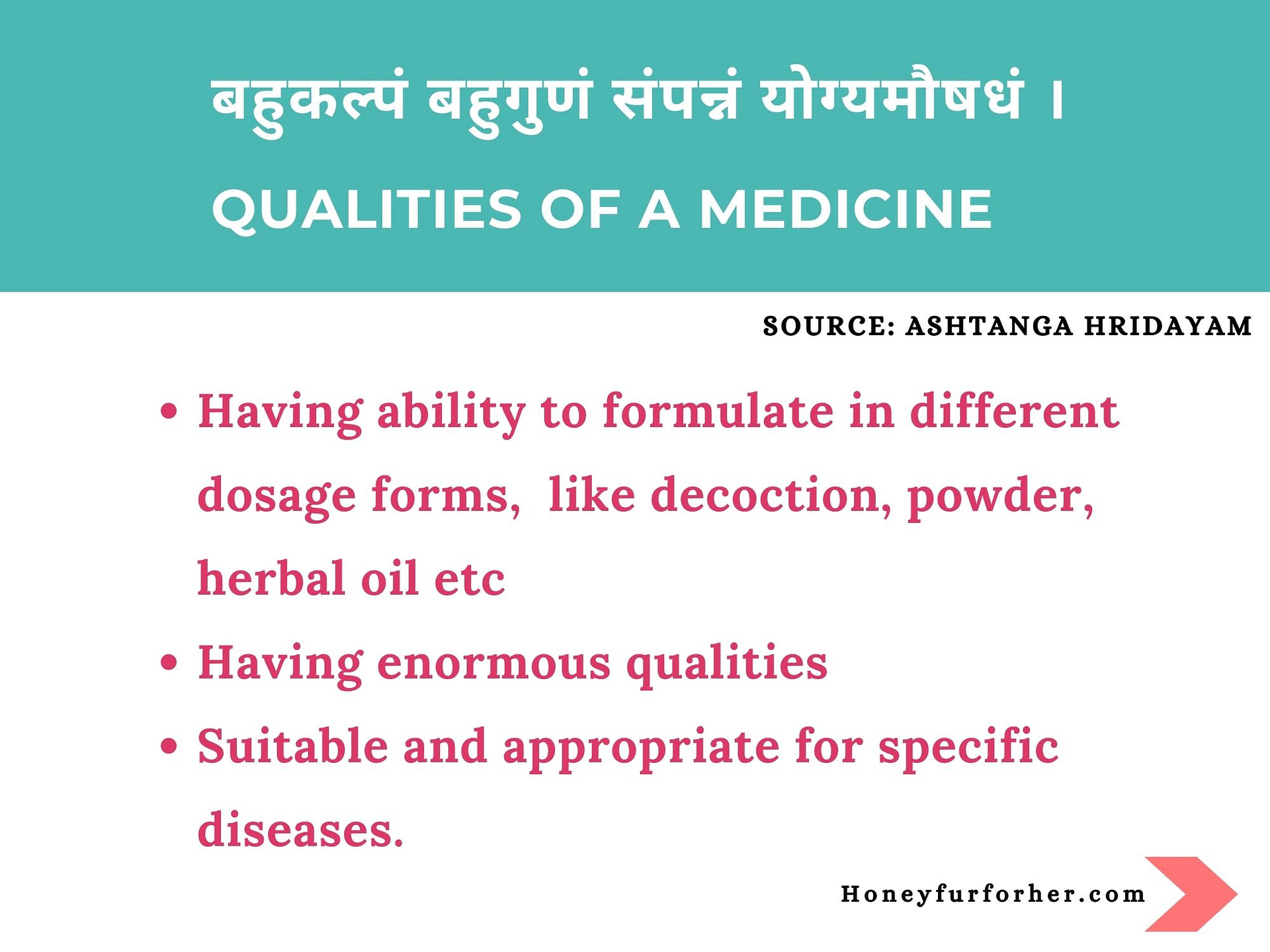
English Translation:
Bahukalpa – Ability to formulate in different dosage forms, like decoction, powder, herbal oil etc
Bahuguna – Having enormous and multiple qualities
Sampanna – Endowed with virtues
Yogya – suitable and appropriate for specific diseases.
#14. Qualities Of A Nurse
Source: Ashtanga Hridayam
अनुरक्त: शुचिर्दक्षो बुद्धिमान् परिचारकः ।
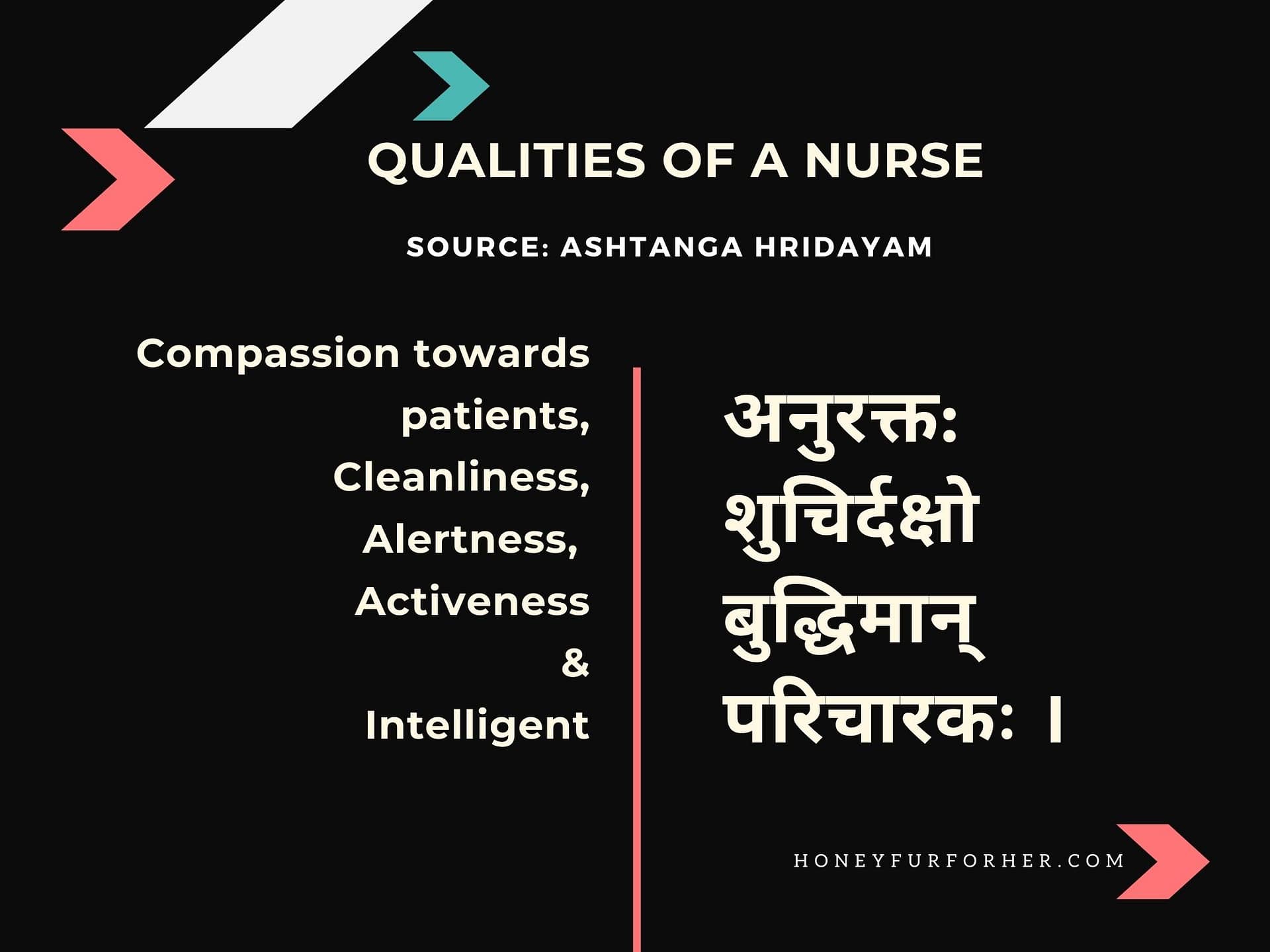
English Translation:
Anurakta – Compassion towards patients
Shuchi – Cleanliness
Daksha – Alert, active
Buddhiman – Intelligence
#15. Qualities Of A Patient
Source: Ashtanga Hridayam
आढ्यो रोगी भिषग्वश्यो ज्ञापक: सत्त्वानपि ।
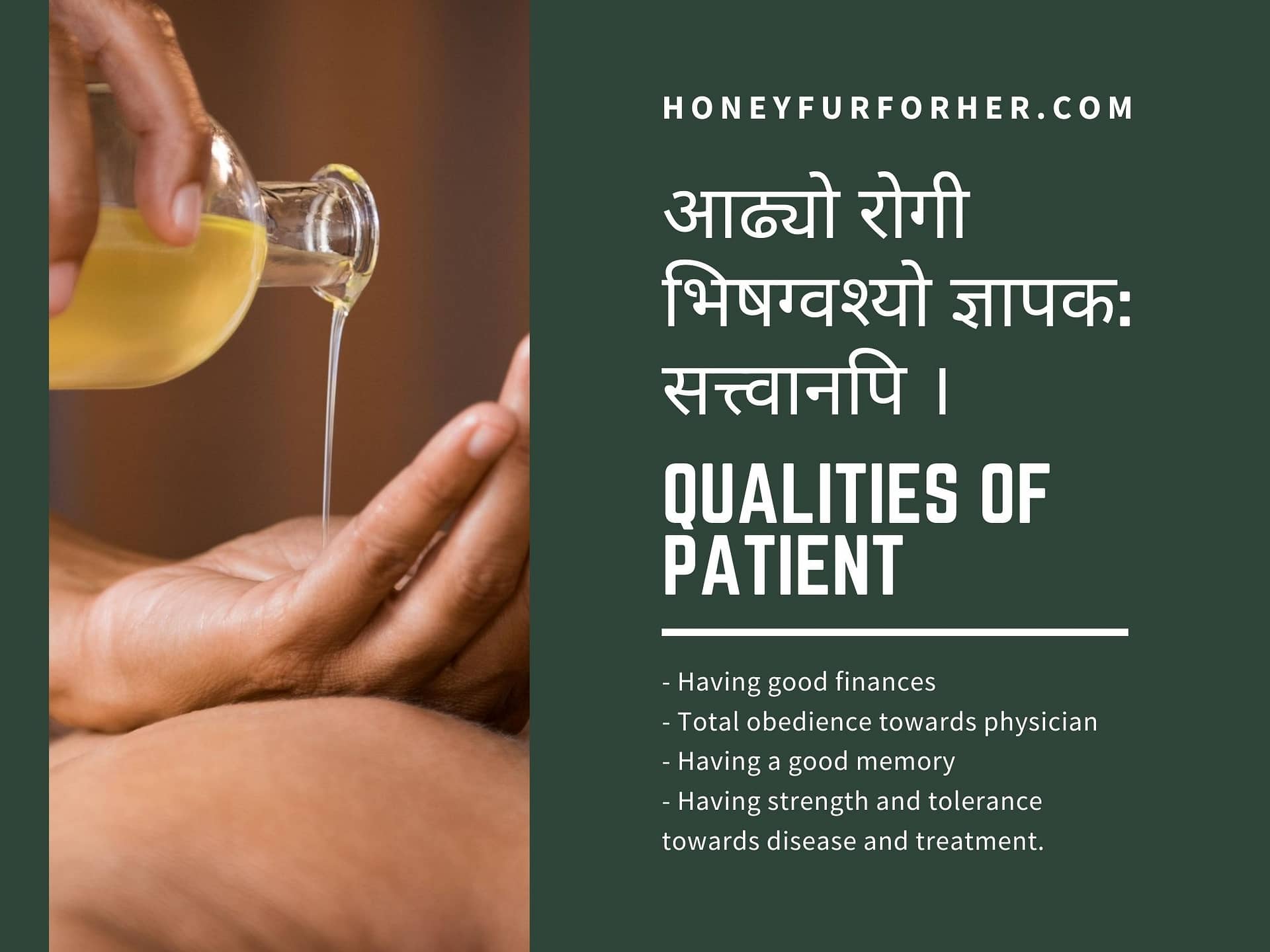
English Translation:
Adya – Having good finances
Bhishagvashya – 100 % obedience towards doctor
Jnapaka – Good memory
Satvavaan – Having good strength to tolerate disease and treatment.
#16. Prataruthana (Waking up in the morning)
ब्राहमे मुहूर्त उत्तिष्ठेत्स्वस्थो रक्षार्थमायुष: ।
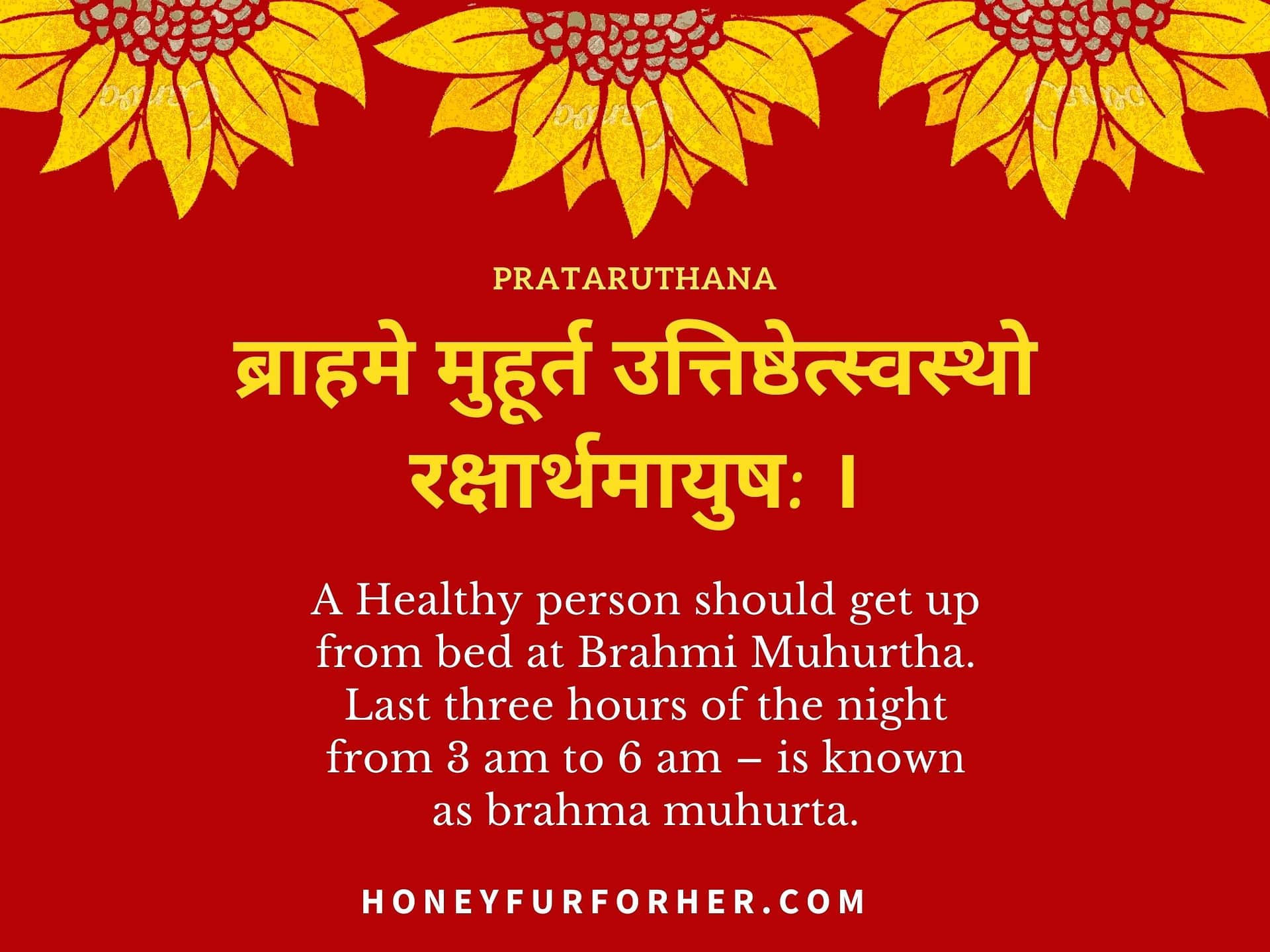
English Translation:
Healthy person should get up from bed at Brahmi Muhurtha. That is, before dawn, or around 45 minutes before Sun rise. Last three hours of the night – from 3 am to 6 am – is called brahma muhurta.
#17. A Perfect Physician
तस्माच्छस्त्रोसर्थेविज्ञाने प्रव्रत्तौ कर्म दर्शने ।
भिषक् चतुष्टये युक्त: प्राणाभिसर उअय्ते ॥
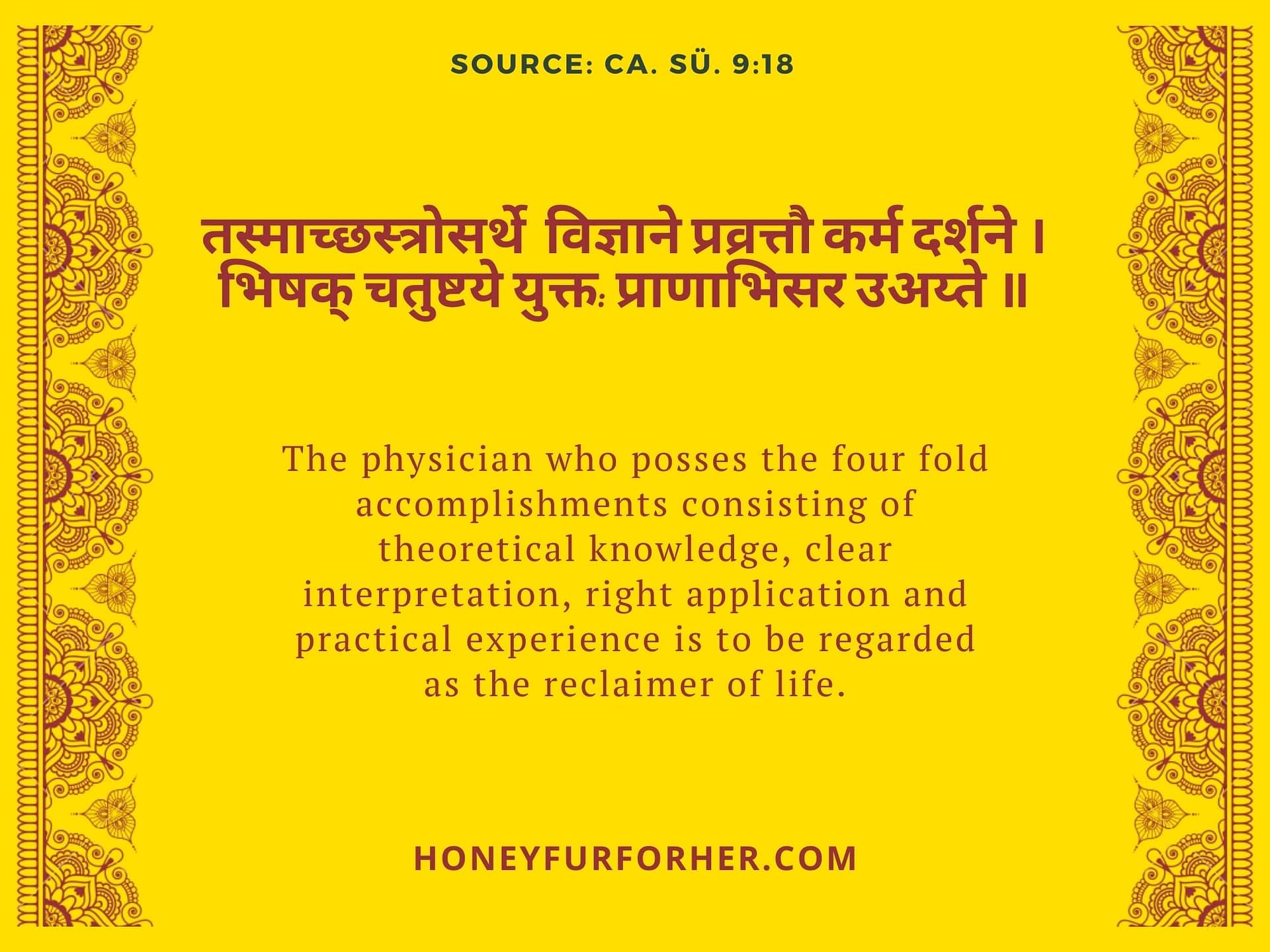
English Translation:
The physician who posses the four fold accomplishments consisting of theoretical knowledge, clear interpretation, right application and practical experience is to be regarded as the reclaimer of life.
#18. Nadi Prediction
Source: Yoga Ratnakar
वातं पित्तं कफं द्वन्द्वं त्रितयं सान्निपतिक्म् ।
साध्यासध्यविवेकं च सर्व नाडी प्रकाशयेत ॥
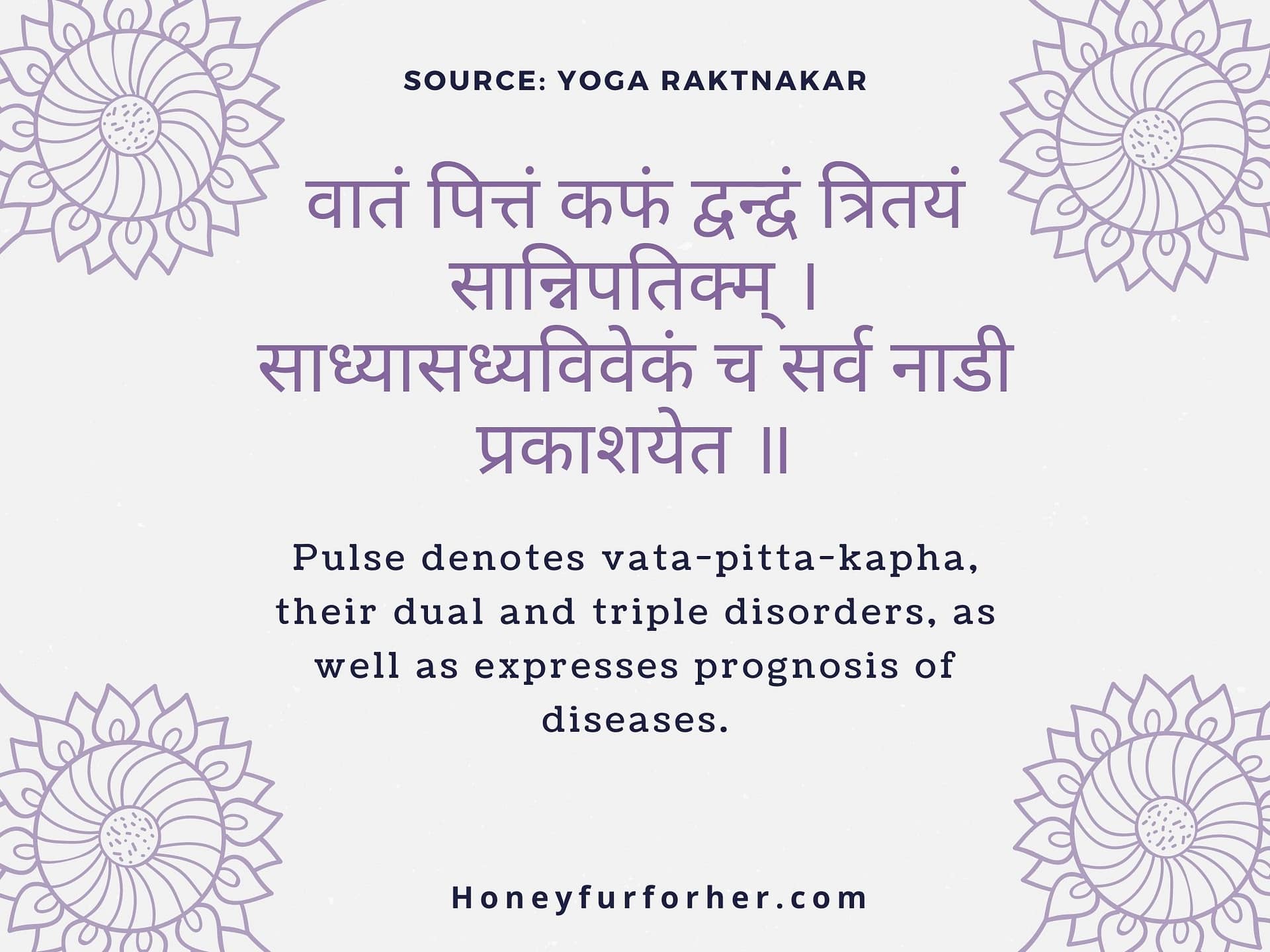
English Translation:
Pulse denotes vata-pitta-kapha, their dual and triple disorders, as well as expresses prognosis of diseases.
#19. Ushnajala: Benefits of Drinking Hot Water
Source: Ashtanga Hridayam
दीपनं पाचनं कण्ठ्य लघूष्णं बस्तिशोधनम
हिध्माध्मानानिलश्लेष्मसद्य: शुद्धिनवज्वरे
कासामपीनसश्वासपाश्र्वेरुक्षुचशस्यते
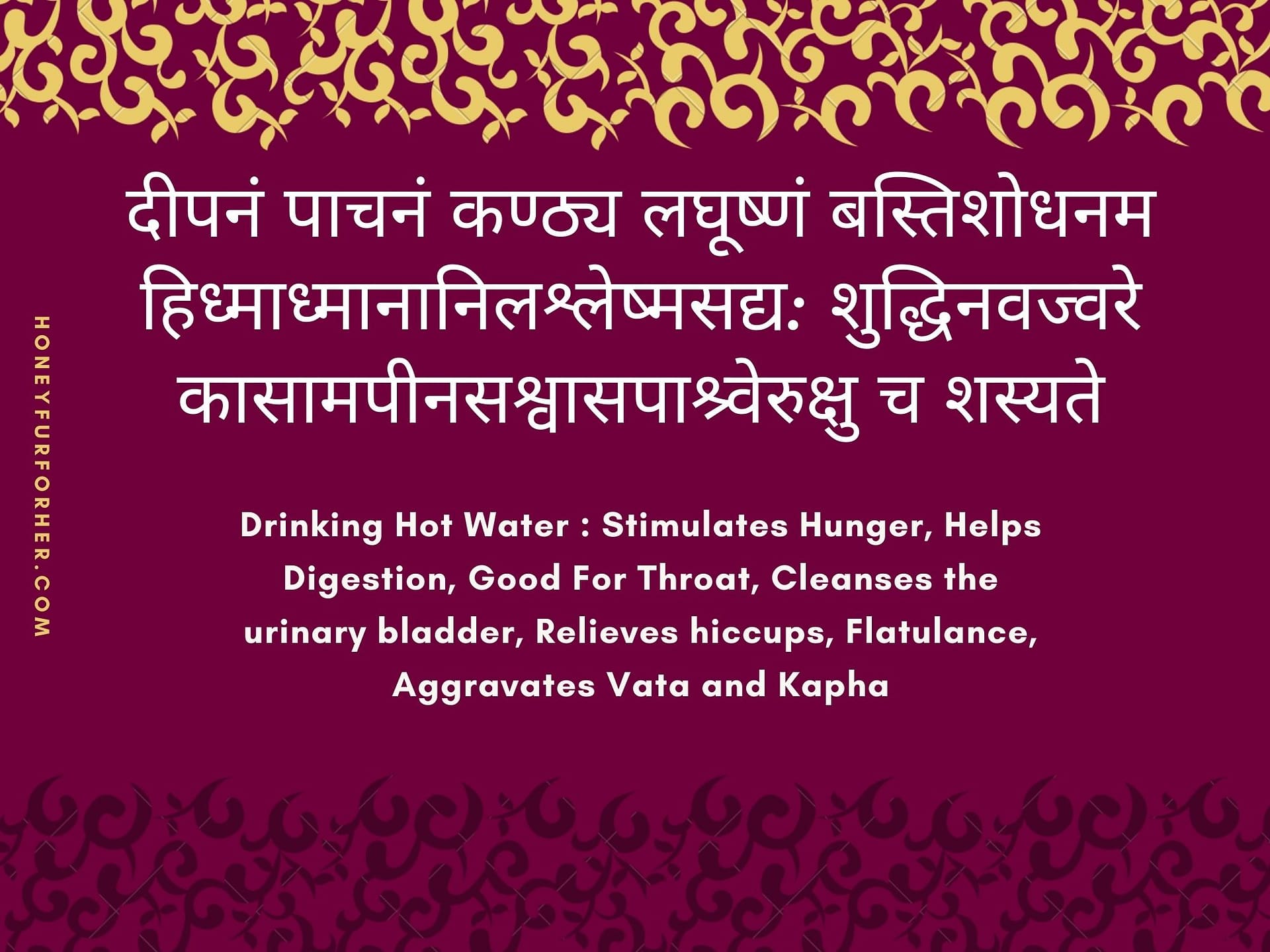
English Translation:
Benefits of drinking hot water:
Deepana – stimulates hunger,
Pachana – helps digestion,
Kantya – good for the throat,
Laghu – easily digestable,
Basti shodhana – cleanses the urinary bladder,
It Relieves:
Hidhma – relives hiccup,
Adhmana – flatulence,
Anila – aggravation of Vata
Shleshma – aggravation of Kapha
It is ideal on the days of Panchakarma therapy
Navajvara – fever of recent origin
Kasa – cold, cough
Ama – accumulation of undigested materials,
Peenasa – rhinitis (running nose),
Shwasa – dyspnoea and
Parshvaruja – pain in the flanks.
#20. Effect Of Tastes On Tridosha
Source: Ashtanga Hridayam
तत्रादया मारुतं घ्नन्ति त्रय: तिक्तदय: कफम् ।
कषाय तिक्त मधुरा: पित्तमन्यते तु कुर्वते ॥
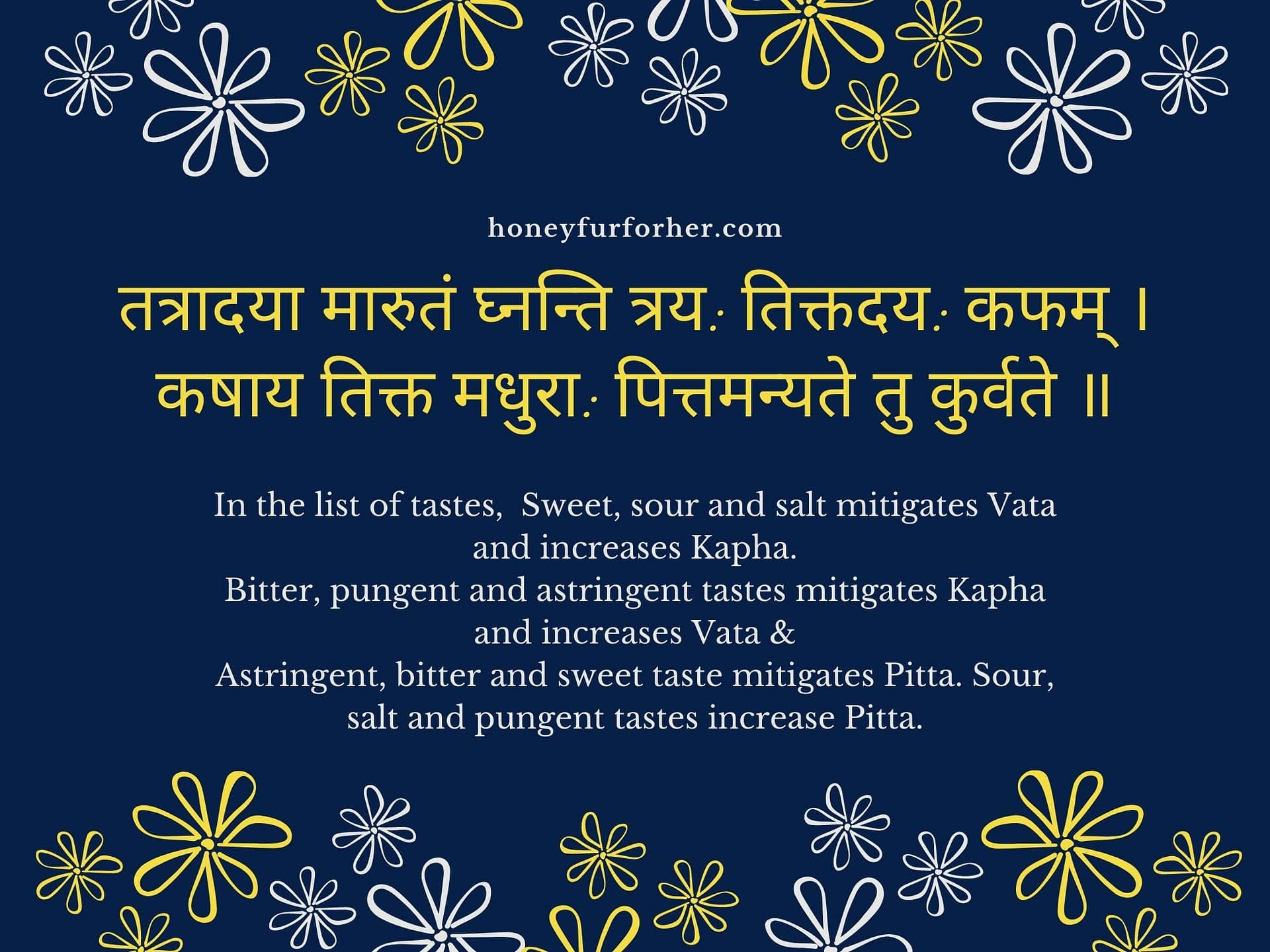
English Translation:
In the list of tastes, the first three, i.e. Sweet, sour and salt mitigates Vata and increases Kapha.
The last three, i.e. bitter, pungent and astringent tastes mitigates Kapha and increases Vata
Astringent, bitter and sweet taste mitigates Pitta. Sour, salt and pungent tastes increase Pitta.
#21. Abhyanga – oil massage & its benefits
Source: Ashtanga Hridayam
अभ्यङ्गं आचरेत नित्यं, सजराश्रमवातह
दृष्टि प्रसाद पुष्टि आयु: सुस्वप्न सुत्वक् दार्ढ्यक़ृत्
शिर: श्रवणपादेषु तं विशेषन शीलयेत
वर्ज्योअभ्यंग: कफग्रस्थकृतसंशुद्धिअजिर्णिभि
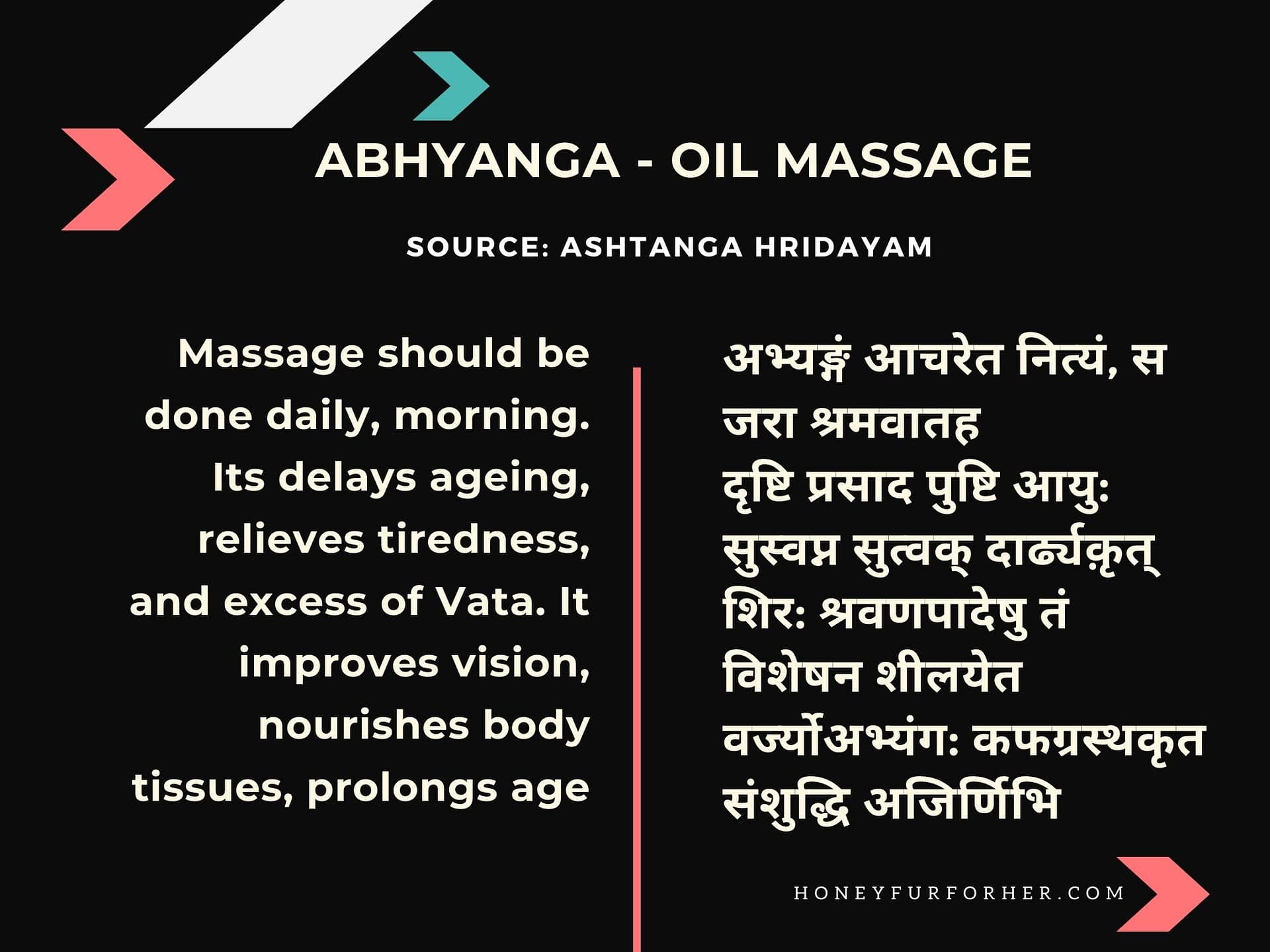
English Translation:
Abhyanga means massage. It should be done daily, morning. It delays ageing, relieves tiredness and excess of Vata (aches and pains). It improves vision, nourishes body tissues, prolongs age, induces good sleep and improves skin tone and complexion. Massage should be specially done on ears, head and legs.
Massage should be avoided when there is increase of Kapha in the body, soon after Shodhana (Panchakarma procedure) and during indigestion.
#22. Sad Vritta: Healthy Conduct
Source: Ashtanga Hridayam
जीर्णे हितं मितं चाद्यात न वेगानीरयेत बलात ।
न वेगितो अन्यकार्य: स्यात न अजित्वा साध्यं आमयम ॥
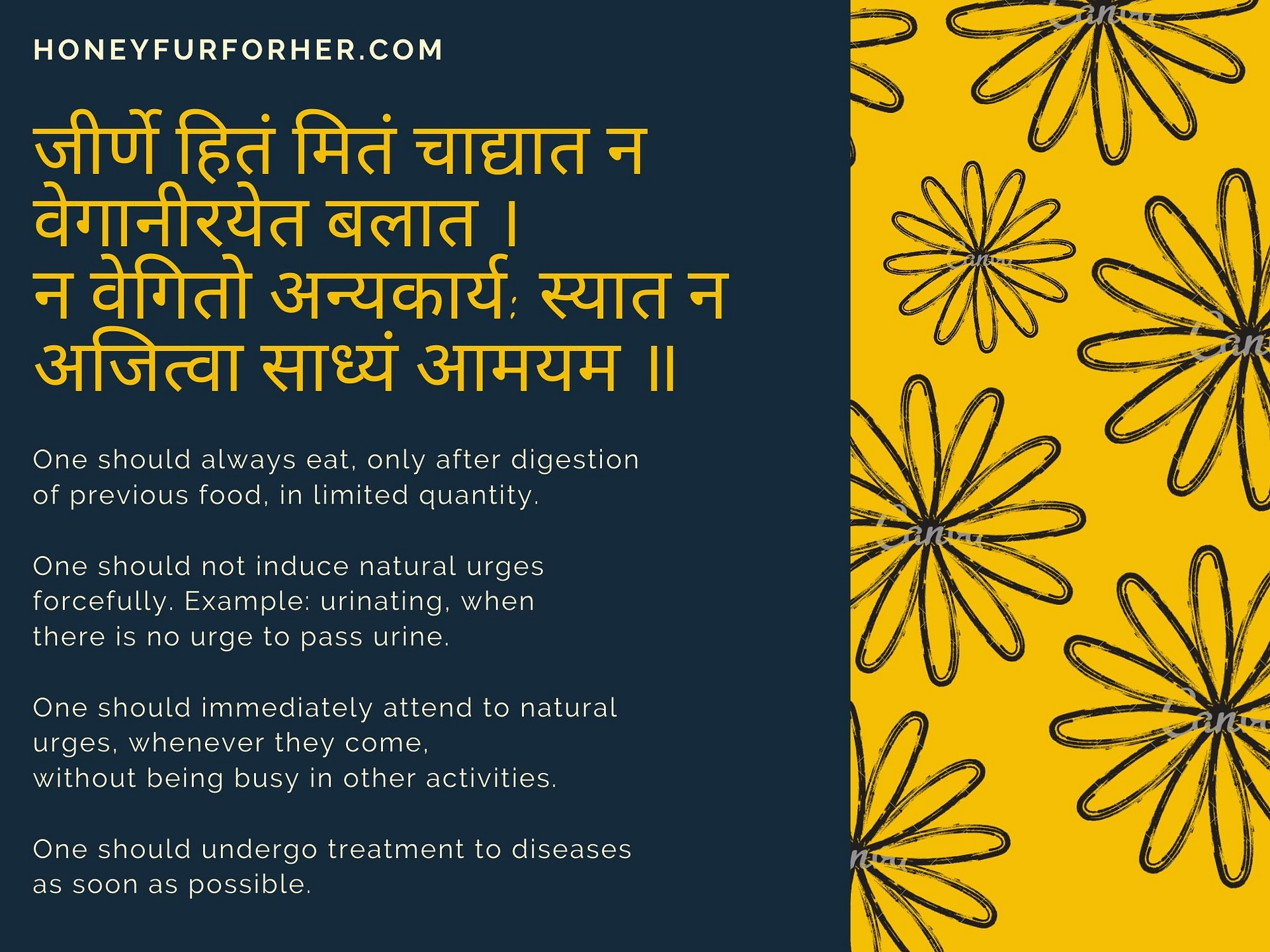
English Translation:
Jeerne hitam mitam chaadyat – One should always eat, only after digestion of previous food, in limited quantity.
Na vegan neerayet – one should not induce natural urges forcefully. Example: urinating, when there is no urge to pass urine.
Na Vegito anya kaaryaha – one should immediately attend to natural urges, whenever they come, without being busy in other activities.
One should undergo treatment to diseases as soon as possible.
#23. Path Of Righteousness
Source: Ashtanga Hridayam
सुखार्था: सर्वभूतानां मता: सर्वाः प्रवृत्तय: ।
सुखं च न विना धर्मात तस्मात धर्मपरो भवेत ॥
भक्त्त्या कल्याणमित्राणि सेवेत्तेतरदूरग:
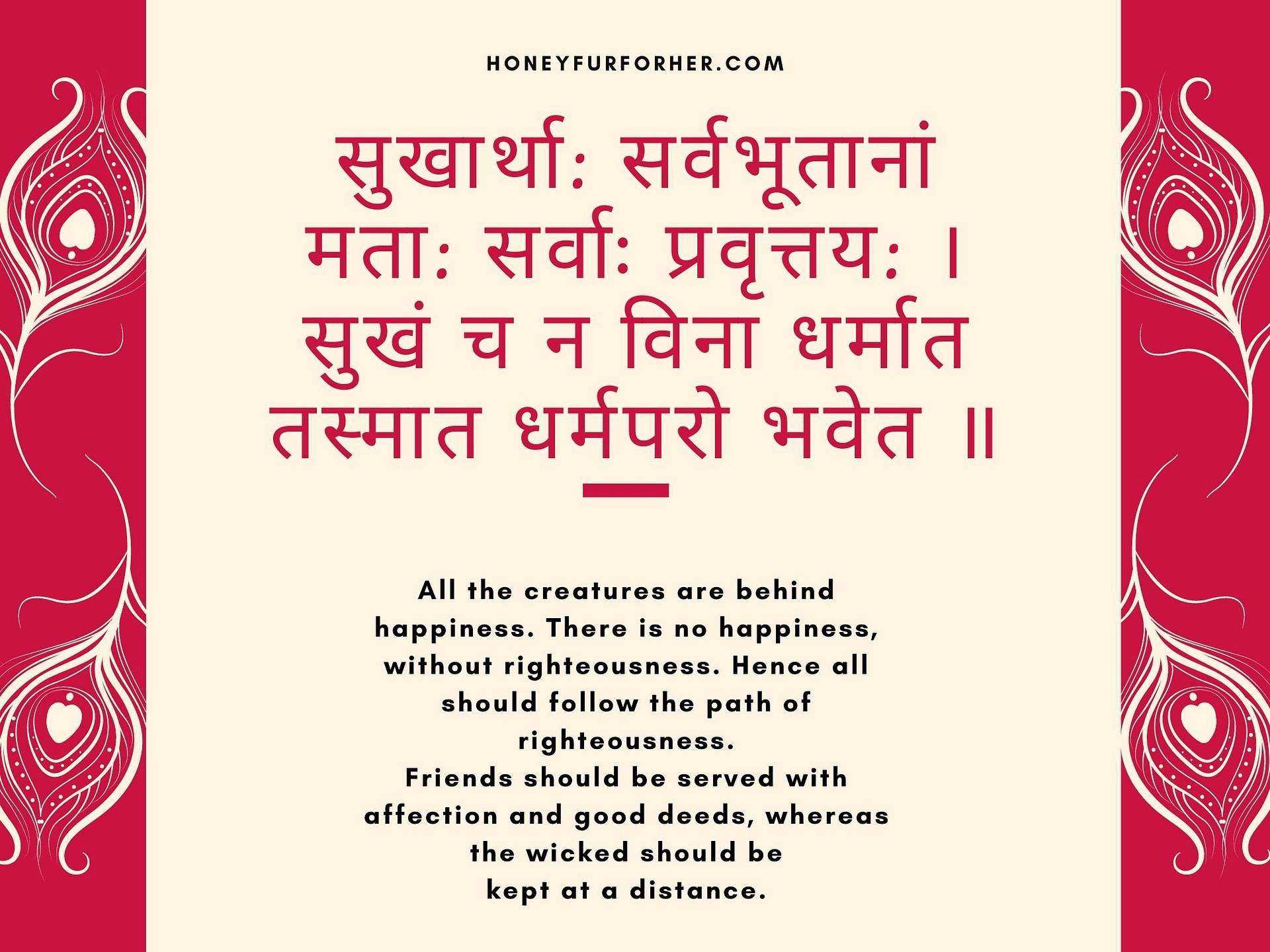
English Translation:
All the creatures are behind happiness. There is no happiness, without righteousness. Hence all should follow the path of righteousness.
Friends should be served with affection and good deeds, whereas the others (wicked) should be kept at a distance.
#24. Help To The Weak
Source: Ashtanga Hridayam
अवृत्तिव्याधिशोकार्ताननुवर्तेत शक्तित:
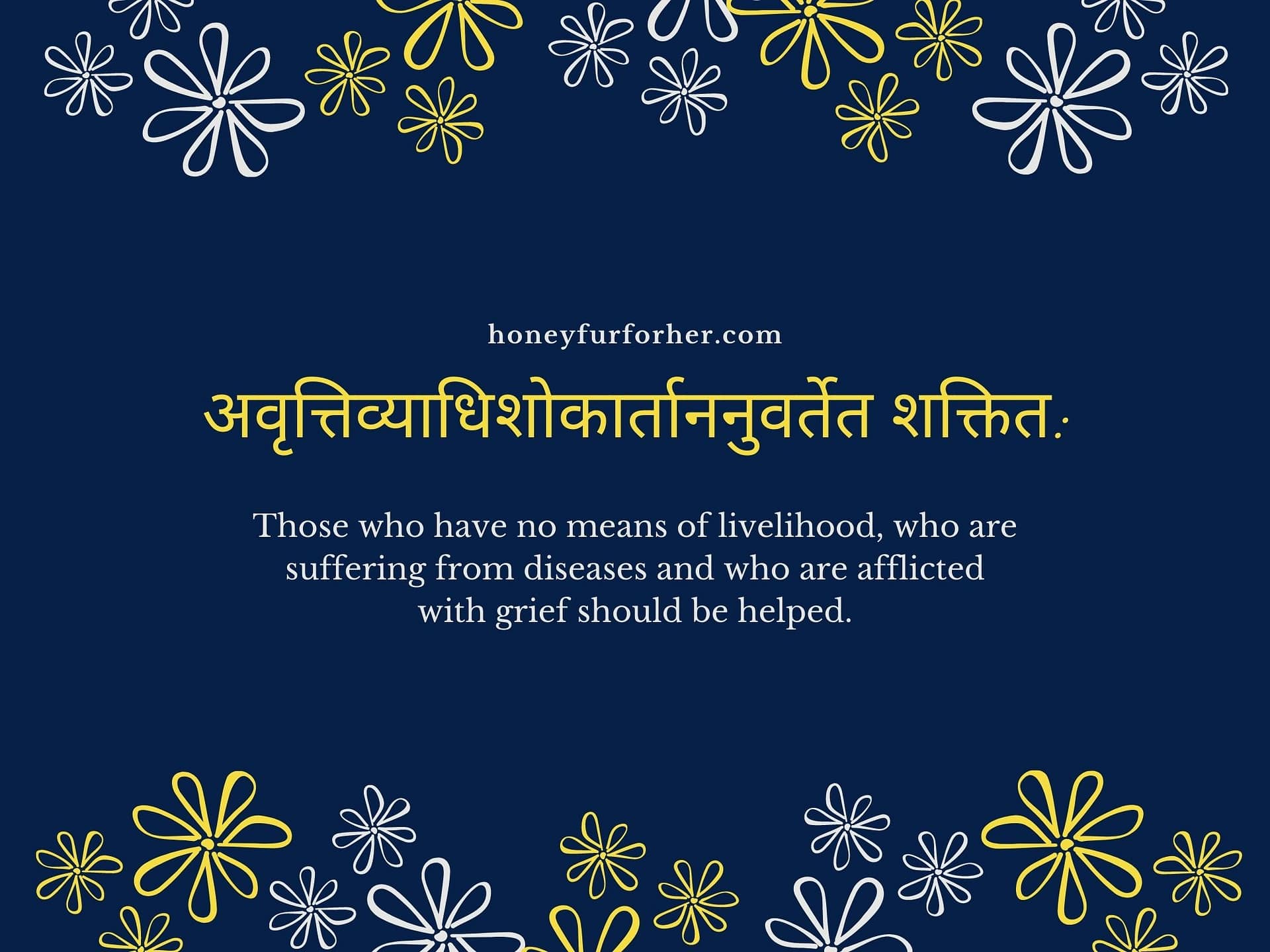
English Translation:
Those who have no means of livelihood, who are suffering from diseases and who are afflicted with grief should be helped.
#25. Equal Treatment To All
Source: Ashtanga Hridayam
आत्मवत्सततं पशय्दपि कीटपिपीलिकम् अर्च्येद्दवगोविप्रवृद्धवैध्यनृपातिथीन्
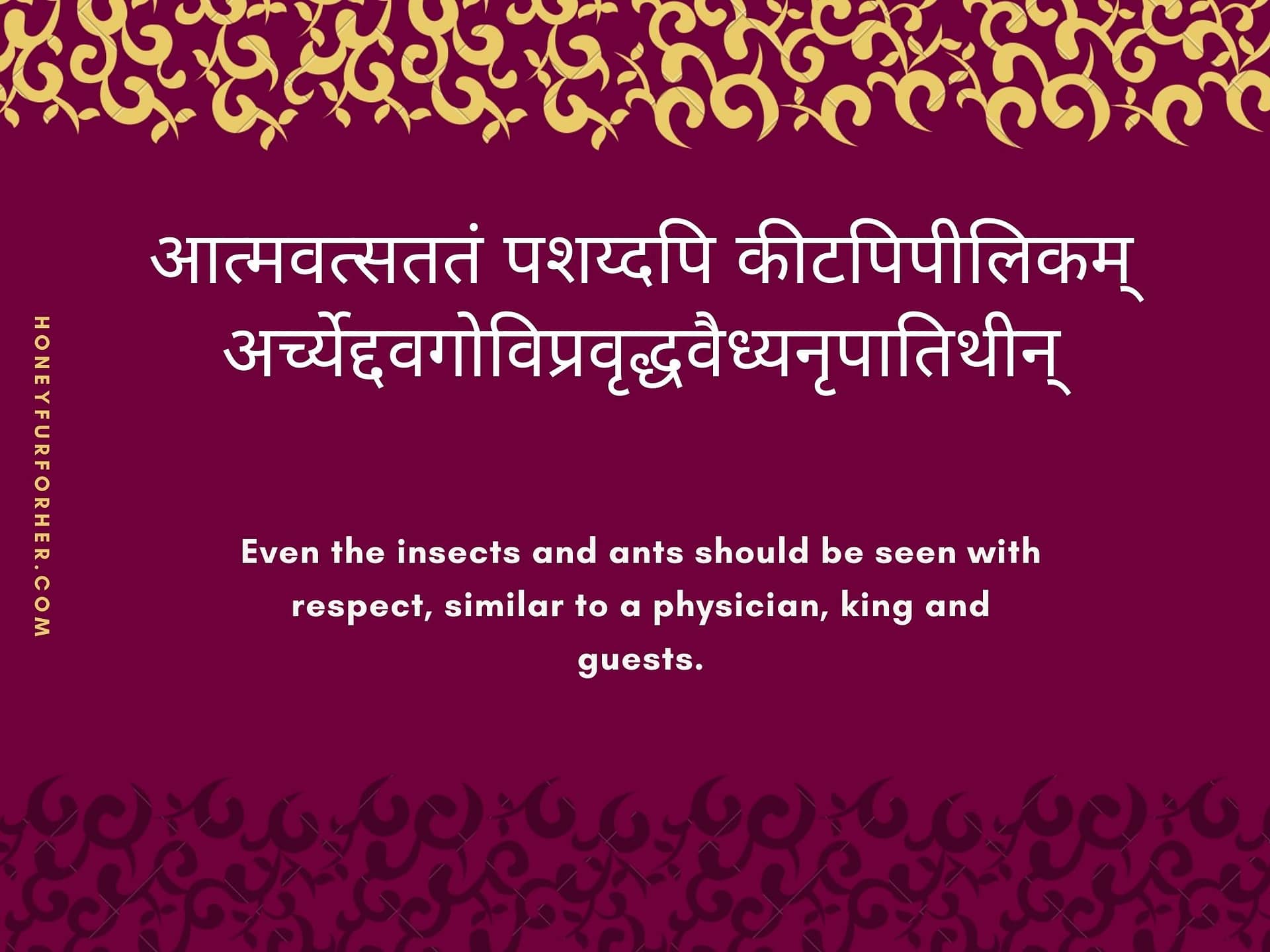
English Translation:
Even the insects and ants should be seen with respect, similar to a physician, king and guests.
#26. Engage In Dharma
Source: Ashtanga Hridayam
त्रिवर्गशून्यं नारम्भं भजेत्तं चविरोधयन्

English Translation:
Do not engage yourself in things that are devoid of three pursuits Dharma (righteousness), arha (wealth) and kama (pleasure). One should carry on the occupation without going contrary to dharma and karma.
#27. Trayopastambha: Three Pillars Of Life
Source: Ashtanga Hridayam
आहारशयनाब्रह्मचर्येर्युक्त्या प्रायोजितै:
शरीरं धार्यते नित्यमागारमिव धारणै:॥
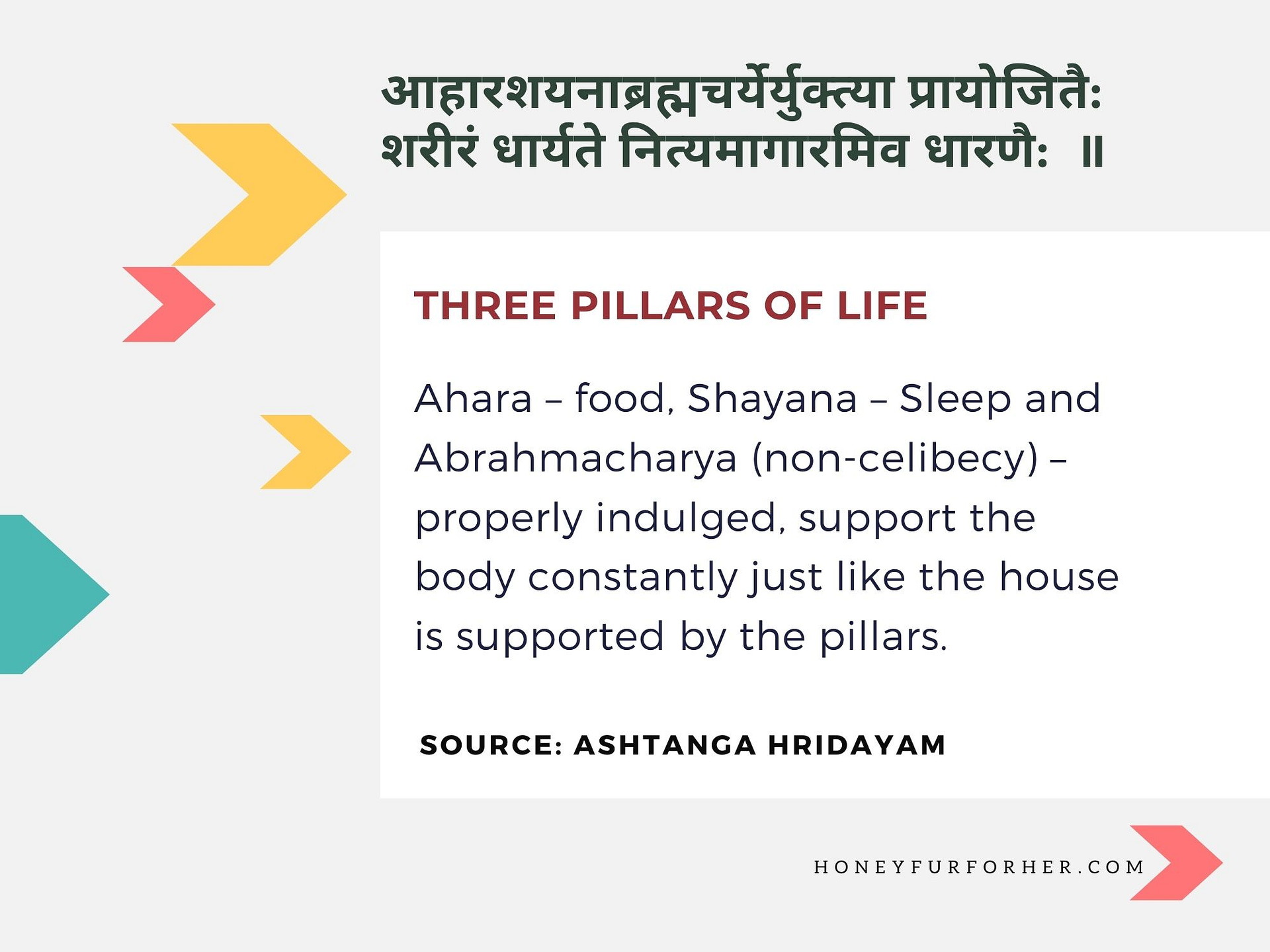
English Translation:
Ahara – food, Shayana – Sleep and Abrahmacharya (non-celibecy): properly indulged, support the body constantly just like the house is supported by the pillars.
Did you find this post useful? Would you like to get back to it later? Save THIS PIN below to your Pinterest Natural Living or Ayurveda board!


Congrats Swati ! Admire you for yur efforts. Keep up the good work. We at Yog For Yourself salute your work.
Thank you. Helps in my own studies
Thank you. Helps in my own studies.
Too bad the slokas can’t be heard.
Hi Marc,
Never thought of putting up recitation. Thanks for the advice! Will try to incorporate them.
Regards,
Swati
Nice thing, it’s really helpful for long live
Thank you for these translations and quotes